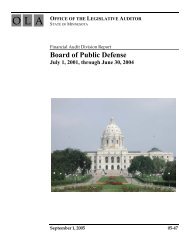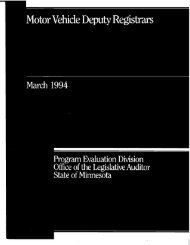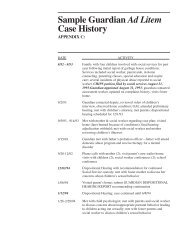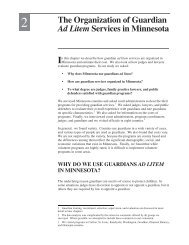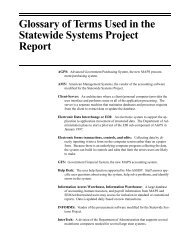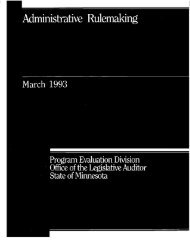Occupational Regulation - Office of the Legislative Auditor
Occupational Regulation - Office of the Legislative Auditor
Occupational Regulation - Office of the Legislative Auditor
Create successful ePaper yourself
Turn your PDF publications into a flip-book with our unique Google optimized e-Paper software.
ORGANIZATION OF OCCUPATIONAL REGULATION 39<br />
Table 2.8: Occupations Regulated by O<strong>the</strong>r Departments, Continued<br />
Number Regulated<br />
Occupation Mode* August 1998<br />
Department <strong>of</strong> Public Safety<br />
Division <strong>of</strong> Driver and Vehicle Services Commercial Driver Training Instructor, Auto L 102<br />
Commercial Driver Training Instructor, Motorcycle L 372<br />
Commercial Vehicle Operator L 169,696<br />
Fire Marshall Division<br />
Journeyman Sprinkler Fitter C 480<br />
Journeyman Sprinkler Fitter, Conditional C 0<br />
Journeyman Sprinkler Fitter, Limited C 50<br />
Design Contractor L 4<br />
Managing Employee Certification C 65<br />
Fireworks Operator L 344<br />
*NOTE: Mode <strong>of</strong> regulation. L=Licensure, indicating practice protection. C=Certification, indicating title protection. R=Registration, indicating<br />
that <strong>the</strong> state maintains a roster <strong>of</strong> practitioners. The use <strong>of</strong> <strong>the</strong>se terms is not necessarily consistent with statutory language.<br />
SOURCE: Program Evaluation Division survey.<br />
<strong>the</strong> total direct and indirect expenditures <strong>of</strong> <strong>the</strong>ir fee income including fees<br />
relating to business regulation and, in some cases, user fees. Some departments<br />
such as Administration and <strong>the</strong> Pollution Control Agency did not report any<br />
revenue from licensure charges in 1998 even though <strong>the</strong>y regulate some<br />
occupations. O<strong>the</strong>r departments such as Children, Families & Learning did not<br />
report any user fees. Because <strong>of</strong> variation in <strong>the</strong> way departments account for<br />
occupational regulatory fees, we do not present any detailed information on<br />
occupational regulatory costs in state departments.<br />
However, as a broad indicator, it is useful to note that statewide, $41.3 million is<br />
identified as occupational licensing charges in 1997 and $42.0 million in 1998 in<br />
<strong>the</strong> Departmental Earnings Report published by <strong>the</strong> Department <strong>of</strong> Finance. This<br />
total is for all state agencies including <strong>the</strong> independent boards.<br />
ROLE OF THE ATTORNEY GENERAL<br />
The <strong>Office</strong> <strong>of</strong> <strong>the</strong> Attorney General provides some special services to <strong>the</strong><br />
independent regulatory boards in addition to <strong>the</strong> legal services it provides to all<br />
state agencies. Chapter 214 specifies a role for <strong>the</strong> Attorney General in <strong>the</strong><br />
investigation <strong>of</strong> complaints against licensed pr<strong>of</strong>essionals, because <strong>of</strong> concern that<br />
<strong>the</strong> public interest would not o<strong>the</strong>rwise be adequately represented in an<br />
investigative process conducted by boards whose membership is largely composed<br />
<strong>of</strong> <strong>the</strong> members <strong>of</strong> <strong>the</strong> pr<strong>of</strong>essions being regulated. In addition, public<br />
accountability is impeded by <strong>the</strong> fact that investigations are highly confidential<br />
under Minnesota’s data privacy laws. 14 In its investigative role, <strong>the</strong> Attorney<br />
General functions as an independent investigator, but it can subsequently represent<br />
14 Minn. Stat. §214.1



